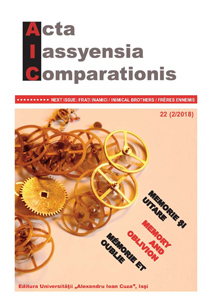Nostos, doliu şi memorie critică în Întoarcerea huliganuluide Norman Manea
Nostos, Mourning and Critical Memory in Întoarcerea huliganului(The Return of the Hooligan) by Norman Manea
Author(s): Alina IorgaSubject(s): History, Studies of Literature
Published by: Editura Universităţii »Alexandru Ioan Cuza« din Iaşi
Keywords: abuses of me - mory; critical memory; “haunt- ing symptom”; “mourning labour”; therapy through writing;
Summary/Abstract: An autobiographic novel, a memoir, as well as a moral, political and critical essay, Întoarcerea huliganului(2003) is a text whose complexity undoubtedly calls for repeated readings. One of the essential aspects of the book, announced even by the more than provocative title, is the obsessive labour of remembering, visible in the memorial and autobiographic pages and turned into cause for meditation in the essayistic sequences. The return/nostos presupposes here, every time, a re-visitation – through the lens of the so-called “critical memory” – of a traumatizing personal past (deportation to Transnistria, confrontation with the communist totalitarian evil, politically conditioned exile) which never ceases to haunt the present and which the memorial-autobiographical writer strives to “bury” in a manner which only appears paradoxical, through the therapeutic exercise of writing. If in terms of personal history, the “mourning labour” targeted by the therapy through writing remains fatally incomplete, in terms of the revisited (and revised) “great history”, the “hooligan”-Artist gains the upper hand against “commemorative bulimia” as a form of “tyranny of memory” – an unsuccessful mask for the abuses of forgetfulness.
Journal: Acta Iassyensia Comparationis
- Issue Year: 2/2018
- Issue No: 22
- Page Range: 149-157
- Page Count: 9
- Language: Romanian

